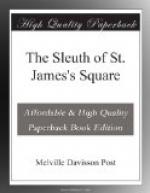She laughed with me at the direct, virile idiom of young America in action.
An event interrupted the discourse. The motor took a sharp curve and a young man running across the road suddenly flung himself face down in the grass beyond the curb.
“Is he hurt?” said Marion to the chauffeur.
“No, Miss, he’s hiding, Miss,” said the man, and we swept out of sight.
I thought it more likely that the creature was in liquor. In spite of the great country-houses, it was not good hunting-ground for the criminal class, during the season when everybody was about. The very number of servants, when a place is open, in a rather effective way, police it. Besides the young man looked like a sort of workman. One gets such impressions at a glance.
The motor descended the long hill toward the river and the flat valley. It hummed into the curves and hollows, through the pockets of chill air, and out again into the soft September night.
Then finally it swept out into the flat valley, and stopped with a grind of the emergency brake that caused the wheels to skid, ripping up the dust and gravel. For a moment in the jar and confusion we did not realize what had happened, then we saw a great locomotive lying on its side, and a line of Pullmans, sunk to the axles in the soft earth.
The whole “Montreal Express” was derailed, here in the flat land at the grade crossing. The thing had been done some time. The fire had been drawn from the engine; there was only a sputtering of steam. The passengers had been removed. A wrecking-car had come up from down the line. A telegrapher was setting up a little instrument on a box by the roadside. A lineman was climbing a pole to connect his wire. A track boss with a torch and a crew of men were coming up from an examination of the line littered with its wreck.
I hardly know what happened in the next few minutes. We were out of the motor and among the men almost before the car stopped.
No one had been hurt. The passenger-coaches were not turned over, and the engineer and fireman had jumped as the cab toppled. By the greatest good fortune the train had gone off the track in this low flat land almost level with the grade. Several things joined to avoid a terrible disaster; the flat ground that enabled the whole train to plow along upright until it stopped, the track lying flush with the highway where the engine went off, and the fact that trains must slow up for this grade crossing. Had there been an embankment, or a big ditch, or the train under its usual headway the wreck would have been a horror, for every wheel, from the engine to the last coach, had left the rails.
We were an excited group around the train’s crew, when the trackman came up with his torch. Everybody asked the same question as the man approached.
“What caused the accident?”
“Spread rails,” he said. “These big brutes,” he pointed to the mammoth engine sprawling like a child’s top on its side, the gigantic wheels in the air, “and these new steel coaches, are awful heavy. There’s an upgrade here. When they struck it, they just spread out the rails.”




